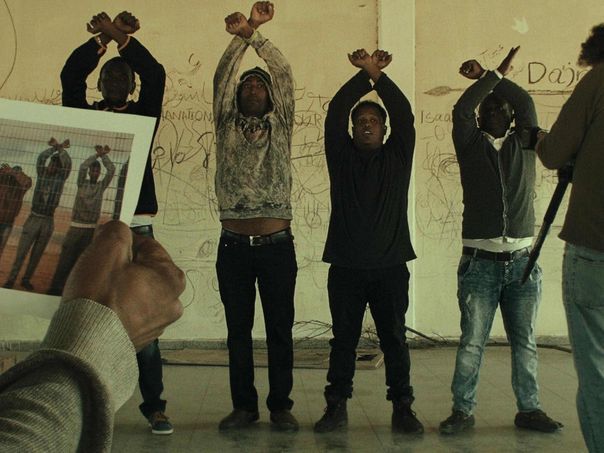We Are All Theatre
Sevara Pan of the 2016 Berlinale Talent Press reviews Avi Mograbi's and Chen Alon's Berlinale Forum film BETWEEN FENCES.

Avi Mograbi's and Chen Alon's BETWEEN FENCES.
Following the principles of Augusto Boal’s “Theatre of the Oppressed,” BETWEEN FENCES (Israel/France, Berlinale Forum), directed by the great Israeli auteur Avi Mograbi and theater facilitator Chen Alon, aims to bring about legislative change and social justice through art. The director engages both African asylum-seekers and Israeli citizens in a dialogue and critical reflection on the refugee crisis by introducing them to theatre. The film documents workshops in the Holot detention centre near the Egyptian border which houses thousands of rejected asylum-seekers whom the state of Israel officially designates as dangerous infiltrators but is unable to deport due to the country’s policies. Asylum-seekers from Eritrea and Sudan stage scenes from their own lives – roleplaying the drama of those who decide to stay and those who decide to leave. By filming theatre acts in an empty hall or wardroom, the director draws our attention to the African asylum-seekers turned actors, who are often mere “shadows on the streets of Israel” as Mograbi himself pointed out during the Q&A.
The use of ordinary objects such as chairs or kerchiefs denies us the opportunity to deflect from the raw emotion of drama which feels far too real to be fictional. In some scenes, actors are seen sculpting their own bodies into static images that depict their internal feelings of forced migration and discrimination. While the notion of theatre in prison has been explored in earlier documentaries from the Middle East (e.g. Zeina Daccache’s 12 ANGRY LEBANESE), Mograbi’s BETWEEN FENCES not only erodes the stigma associated with prisoners but also dramatically reverses established roles, thus negotiating the concept of the Other in society. As the theatre workshop unfolds, Mograbi makes a daring move by involving Israeli men and women in the theatre troupe and assigning them the role of African refugees who are trying to cross the Israeli border. “This is not very real,” one of the African actors says. “Well, the words are real, but the colour is not,” he adds. BETWEEN FENCES is a compelling and poignant film that shows how the temporary identification with the oppressed fosters a more profound understanding of what it means to be free in a society that detains those seeking protection.

